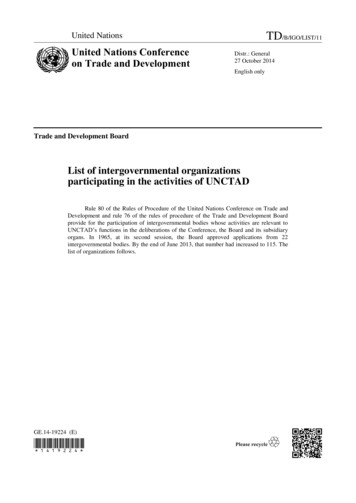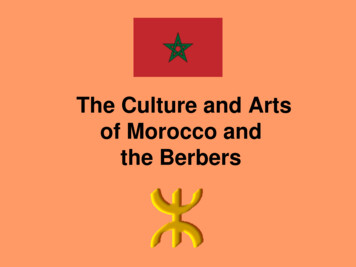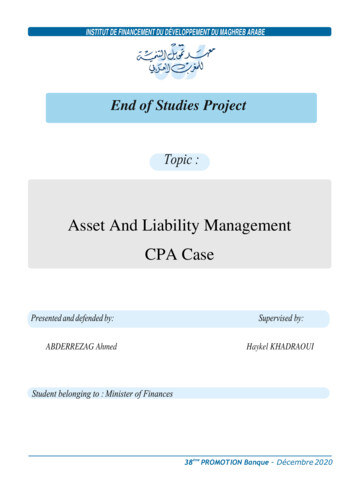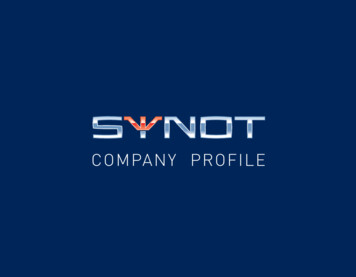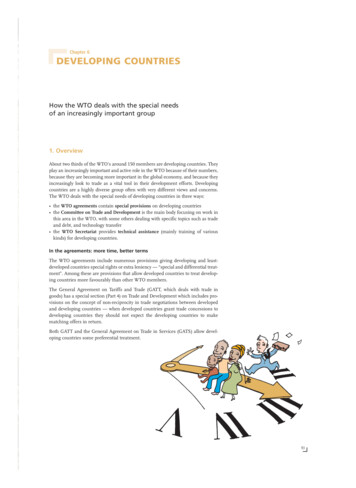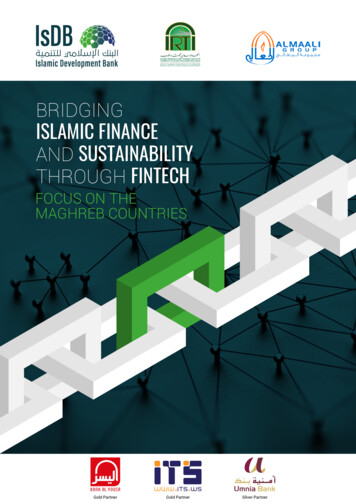
Transcription
ALMAALIG R O U P ﻣــﺠــﻤــﻮﻋــــﺔ �� INSTITUT ISLAMIQUE DE RECHERCHE ET DE FORMATIONMEMBRE DU GROUPE DE LA BANQUE ISLAMIQUE DE DEVELOPPEMENTBRIDGINGISLAMIC FINANCEAND SUSTAINABILITYTHROUGH FINTECHFOCUS ON THEMAGHREB COUNTRIESGold PartnerGold PartnerSilver Partner
Copyright Islamic Research andTraining Institute, Islamic DevelopmentBank, 2021Rights and PermissionsThis work is available under the CreativeCommons Attribution 3.0 IGO license (CC BY3.0 IGO) http://creativecommons.org/licenses/by/3.0/igo. Under the CreativeCommons Attribution license, you are free tocopy, distribute, transmit, and adapt thiswork, including for commercial purposes,with proper attribution.CitationIslamic Research and Training Institute,IsDB & Al Maali Group (2021). BridgingIslamic Finance and Sustainability throughFintech: Focus on the Maghreb Countries.Jeddah, Saudi Arabia.All queries should be addressed to theIslamic Research and Training Institute,Islamic Development Bank Group, 8111 KingKhalid Street Al Nuzlah Al YamaniyahDistrict, Unit #1 Jeddah 2444-22332,Kingdom of Saudi Arabia.Bridging Islamic Finance and Sustainabilitythrough Fintech: Focus on the MaghrebCountriesL.D. No. 1442/6401e-ISBN: 978-603-8306-07-9961,332 dc 1442/6401DISCLAIMERThis work is produced by the staff of theIslamic Research and Training Institute (IRTI)with external contributions. The findings,interpretations, and conclusions expressed inthis work do not necessarily reflect the viewsof IRTI or IsDB, or IsDB Board of ExecutiveDirectors. IRTI does not guarantee theaccuracy of the data included in this report,the content of which is intended to providegeneral information only. The report as suchshould not be considered as legal orprofessional advice.
FOREWORDThere is a growing realization that for financeto serve economic development it needs tobe seamlessly integrated with productive,wealth-creating activities. Further, it needs toreflect moral values enhancing principles forgood and sustainable outcomes. However,these features are not expressed fully in thepresent-day financial system. Islamic financethat raised the banner to achieve theseresults, relying on its high principles, is stillstriving to make an impact when operatingamid the conventional regulatory system andthe entrenched debt culture.In this scenario, technological advances haveopened new avenues for Islamic finance toachieve its objectives with more ease. Usefulinnovations have become possible throughrich and big data, artificial intelligence, anddistributed ledger technologies. This is anarea for prospective and intensive research.The Islamic Research and Training Institute(IRTI) is moving in this direction to make financemore useful by applying Islamic principlesof finance together with new technologiesto address economic development andsustainability challenges. We understandthat at present there is an overemphasis inIslamic banking on collateral and warranteesto provide finance. However, collateral andguarantees were the innovations of the pastthat developed the financial system to bringit to today’s level. Now we need new methodsto further develop the financial systemfor its usefulness to the economy and toretain sustainability. Several recent reports,research papers and innovative projects ofIRTI are now aligned to this end.The present report “Bridging Islamic Financeand Sustainability through Fintech—Focus onMaghreb Countries” is part of this effort. Itfocuses on how to leverage fintech in Islamicbanking for linking finance to sustainabledevelopment. These are lofty goals whenthere exist vast variations among countries intheir preparedness for the use of fintech andfinancial innovations towards sustainabledevelopment in general. The report tries tostrike a balance between the reality and theideal. It advocates the use of technologyin Islamic finance for its efficiency andgreater impact on sustainable economicdevelopment.The report was prepared by a teamcomprising researchers from IRTI, led by Dr.Salman Syed Ali, and researchers from AlMaali Group, led by Dr. Wail Aaminou. Supportfrom regional experts and practitioners whocontributed through focus group discussionsand interviews enriched the contents. Theirnames appear in the acknowledgementsection.We hope that this report, its surveys, the caseexperiences, and the recommendations willbe useful for the policy makers of financialsector, technology, and regulation; and thepractitioners working in the Islamic bankingindustry in general, and for the Maghreb regionin particular. We invite our readers to sharetheir feedback on how to further enhance thevalue of the report to the research communityand the decision makers.Sami Al-SuwailemActing Director General, IRTI
EDITORIALThe Covid-19 pandemic has had devastatingeffects on the Maghreb region with a massivecontraction of global GDP and a degradation ofsocial indicators including health, education,unemployment, and inequality. These effectshave wiped out many achievements madeduring the last decade.Building back in the post-covid era and keepingSDGs on track requires strong involvementnot only from governments but also from theprivate sector, especially financial institutions.Participative (Islamic) finance should naturallytake part in this process given the centrality ofethics in their core value proposition.This report sheds light on the role ofparticipating financial institutions in closingthe financing gap for SDGs in the Maghrebregion. It focuses on leveraging fintech toalign participative finance and sustainabledevelopment.I believe that the present report provides avaluable contribution to regulators, financialinstitutions, non-profit organizations as wellas fintech companies in the Maghreb region onhow to create synergies and setup ecosystemsthat support doing well while doing good.Wail AAMINOUCEO, ALMAALI GROUP
ACKNOWLEDGEMENTThis report was co-authored by Al Maali Group and IRTI.From Al Maali Group, the primary authors were WAILM. AAMINOU, AHMED TAHIRI JOUTI, FADWA CHAKERand HOUSSAM AYAOU supported by ANAS HOUZALI,ABDELILAH EL MORTAJI and CHAYMAA TALAAT IDRISSI.From IRTI, the primary authors and theme developerswere SALMAN SYED ALI supported by HILAL M. HUSSAINand RAMI ABDUL KAFI.We also would like to extend our appreciation to thefollowing experts who participated in the interviewsand provided valuable insights on topics of fintech andsustainable development in the context of MaghrebIslamic Financial Institutions: Mr. ESAM ALKHESHNAM, CEO OF INTERNATIONALTURNKEY SYSTEMS - ITS Mr. MAHFOUDH BAROUNI, FORMER CEO OF ZITOUNABANK AND BOARD MEMBER IN SEVERAL IFIs inTUNISIA Dr. SAID BOUHERAOUA, DIRECTOR OF RESEARCHAFFAIRS DEPARTMENT AT ISRA AND ADVISOR TOSEVERAL IFIs Mr. FOUAD HARRAZE, FORMER CEO OF AL AKHDARBANK, MOROCCO Mr. ANAS HASNAOUI, INTERNATIONAL EXPERT INECONOMIC EMPOWERMENT AND ISLAMIC SOCIALFINANCE Mr. NASSER HIDEUR, CEO OF AL SALAM BANK, ALGERIA Mr. ABDESSAMAD ISSAMI, CEO OF UMNIA BANK Mrs. MOUNA LEBNIOURY, CEO OF BANK AL YOUSR Mr. MOHAMED MAAROUF, FORMER CEO OF BTI BANK,MOROCCO M r. HAMID RASHID, CEO OF FINTERRAAs Al Maali Group and IRTI retained editorial control overthe report, the participation of these experts should not beviewed as an endorsement of all messages in the report.
CONTENTS03FOREWORD05ACKNOWLEDGEMENT11EXECUTIVE SUMMARY 16INTRODUCTION27SUSTAINABLEDEVELOPMENTIN MAGHREBREGION50SUSTAINABILITYINTEGRATION INTHE BUSINESSMODELSOF MAGHREBISLAMIC FINANCIALINSTITUTIONS1. About Sustainable Development 2. About Fintech 3. The need to bridge Islamic finance and sustainability through Fintech 4. Purpose and target audience of the report 5. Structure of the report 17202223261. Maghreb Countries’ Commitment to the sustainable development 1.1. Morocco 1.2. Tunisia 1.3. Algeria 292931332. Achievement of the SDGs in the Maghreb Countries 2.1. Thematic Assessment – SDG 1: No Poverty 2.2. Thematic Assessment – SDG 3: Good Health 2.3. Thematic Assessment – SDG 4: Quality Education 2.4. Thematic Assessment – SDG 8: Decent Work and Economic Growth 36384042443. The Impact of Covid-19 on Achieving the SDGs in the Maghreb Region 46Conclusion 491. General overview of Islamic and Social Finance in the Maghreb countries 1.1. Islamic Banking 1.2. Takaful 1.3. Islamic Capital Markets (ICM) 1.4. Social finance in the Maghreb 51516061612. The rationale behind the integration between the Islamic Financial sector andSustainable Development in the Maghreb countries 653. Sustainability integration in Maghreb Islamic Financial Institutions 67Conclusion 70
71FINTECH LANDSCAPEIN MAGHREB REGION91LEVERAGING FINTECHFOR SUSTAINABLEDEVELOPMENT:A SELECTION OFINTERNATIONALEXPERIENCES1. The Maghreb Fintech Paradox 1.1. Drivers of Fintech emergence in Maghreb 1.1.1. Young population 1.1.2. Digitally oriented population 1.1.3. Relatively low financial inclusion 1.1.4. High level of remittances with high transfer costs 1.2. Factors precluding Fintech emergence in Maghreb 1.2.1. Internet quality and availability 1.2.2. Preference for cash 1.2.3. Structure of financial markets 1.2.4. Legal and regulatory framework 72727273747575777879802. Zoom on the Fintech legal and regulatory environment in Maghreb 2.1. Payments 2.2. Digital signature 2.3. Crowdfunding 2.4. Cryptocurrencies 2.5. Fintech Sandboxes 2.6. Start-ups 808083848585863. A selection of Fintech experiences in the Maghreb region 874. Conclusion 901. Poverty and Fragility (SDG1) 2. Zero Hunger (SDG2) 3. Good health and wellbeing (SDG3) 4. Quality education (SDG4) 5. Clean water and sanitation (SDG6) 6. Affordable and clean energy (SDG7) 7. Climate change mitigation (SDG13) 8. Conclusion 94100101103105106107108Introduction 110Policy intervention 1: Completing the existing legal and regulatory framework 111109UNLEASHING FINTECHFOR SUSTAINABLEDEVELOPMENTIN MAGHREB:RECOMMENDATIONSPolicy intervention 2: Regulatory sandboxes 1. Policy presentation 2. Policy objectives 3. Policy implementation process 4. Policy challenges 111111111113113Policy intervention 3: Innovation labs / accelerators 1. Policy presentation 2. Policy objectives 3. Policy Implementation process 4. Policy challenges 114114114115115Policy intervention 4: Developing a taxonomy relatedto green and social finance 1. Policy presentation 2. Policy objectives 3. Policy Implementation process 4. Policy challenges 116116116117117
Policy intervention 5: Capacity and skill building 1. Policy presentation 2. Policy objectives 3. Policy Implementation process 4. Policy challenges 118118118119119Policy intervention 6: Financial and technical literacy for consumers 1. Policy presentation 2. Policy objectives 3. Policy Implementation process 4. Policy challenges 120120120121121Policy intervention 7: Open banking policies 1. Policy presentation 2. Policy objectives 3. Policy Implementation process 4. Policy challenges 122122122123123Conclusion 123124APPENDICES125APPENDIX A: PROGRESSIVE APPROACH IN ADVANCING VBI IMPLEMENTATION (BANK NEGARAMALAYSIA)126APPENDIX B: PRESENTING A SELECTION OF THE MOBILE NETWORK EXPERIENCE METRICS127APPENDIX C: LINKING FINANCIAL INCLUSION TO SDG TARGETS128APPENDIX D: KEY TAKEAWAYS FROM INTERVIEWS WITH EXPERTS (IN ALPHABETICAL ORDER)140ENDNOTES
FacilitatingFintechEmpowering businesses with next generationtechnology to stay ahead of the curve.The Digital Partner trusted by businesses at home andacross the globe.Let’s Stay ConnectedITSCorporateITS Corporate ITSCorporateITSGroupinfo@its.ws
EXECUTIVESUMMARYBRIDGING ISLAMIC FINANCE AND SUSTAINABILITY THROUGH FINTECH FOCUS ON THE MAGHREB COUNTRIES11
The main policy problem thisreport addresses concerns the lowcontribution of Islamic FinancialInstitutions (IFIs) to social,economic and environmentaldevelopment in the Maghrebregion both quantitatively andqualitatively. This problem is rootedin a number of causes and subcauses ranging from scalabilityand regulation to governance andinnovation.To address this problem, thepresent report points out theintegration of social, environmentalandeconomicdevelopmentinto the business models of IFIsthrough fintech as a key leveragepoint.Since 2016, Morocco, Tunisia andAlgeria have defined road mapsfor achieving the SDGs throughnationwide strategies and crosssectorial programs. However,results thus far have shown asignificantoveralldeficiencyin meeting the sustainabilitychallenges in all three countries.Except for SDG 1 (No Poverty)that has been fully met by Algeria,all remaining SDGs fall under theexpected achievement levels by thethree countries in relatively similarpatterns. The lowest performancesare found with respect to GenderEquality (SDG 5), Affordable andClean Energy (SDG 7) and DecentWork and Economic Growth (SDG8). The three countries are eitherstagnating or improving on theseSDGs.Indeed, significant challenges arepredominantly present in 10 out ofthe 17 SDGs with overall improvingpatterns whereby the mostpromising efforts are observed forGood Health and Well-being (SDG3), Clean Water and Sanitation(SDG 6), and Industry, Innovationand Infrastructure (SDG 9).Challenges remain for the threecountries with respect to reducinginequalities (SDG 10), withMorocco and Tunisia particularlyfaced with reducing poverty (SDG1) and fostering responsibleconsumption and production(SDG 12).average, these institutions’ socialand environmental initiativeshave been below customers’expectations. Furthermore, IFIsunderperform their conventionalcounterparts with low levelsof disclosures on ethics andsustainability.The Covid-19 pandemic willinherently exacerbate the alreadyvulnerable Maghreb economies,leading these countries tolargely miss their sustainabledevelopmenttargetsunlesspolicies are improved, internationalcooperation strengthened, andresources to finance investmentsmobilized.IFIs have the legitimacy to play aleading role in reconciling financeand sustainability under a uniquevalue proposition given thecentrality of ethics in the IslamicFinance paradigm, the integrationpotential of Islamic Financeoperations into the real economy,the possible synergies with Awqaf(Islamic endowment funds) andZakat institutions (compulsorycharityfunds),customerspositive attitudes with regard tosustainability front and finally, theneed to build a value propositionthat goes beyond pansion of government serviceswill not be enough to achievethe SDGs. In this context, theintegration of sustainability modelsinto Islamic financial institutionsstrategies will be critical to helpmitigate the impact of the crisisand build more resilient economiesand societies.Although Islamic finance has beenpresent in the Maghreb since the1990’s, the development of thisindustry started only in the 2010’s.From a competitive advantagestandpoint,IslamicFinancialInstitutions rely mainly on debtbased instruments, perceived assimilar to conventional financialproducts, and usually lackeconomies of scale to enablepricing differentiation. As a result,the value proposition of IFIsremains centered around Shari’ahcompliance.On the sustainability side, manyIFIs in the region undertakeseveral social initiatives rangingfrom Qard Hassan and energyconservation to Zakat paymentand charity support. Yet, onFintechs are interesting leversthat facilitate the transitionfrom “business as usual” tomore advanced stages in IFIs’sustainability journey. Indeed,Fintechs support operationalexcellence,fosterproductinnovation and offer the possibilityto radically transform the customerexperience.There are multiple examplesof fintech companies initiatedby public, private and nonprofitorganizations aimed at addressingsustainability challenges. Theseexperiences highlight the role ofFintech in lowering the cost oftransactions, improving efficiencyand fostering innovation in orderto build a value proposition thatreconcile financial profit andimpact imperatives.BRIDGING ISLAMIC FINANCE AND SUSTAINABILITY THROUGH FINTECH FOCUS ON THE MAGHREB COUNTRIES12
While most of the featuredfintech initiatives in this report areoperating in conventional finance,these experiences provide valuableinsights that can be leveraged inthe context of Islamic finance.Unfortunately, The Maghreb regionis among the least developedregions despite the popularityof the topic and supportingenvironmental factors such asa young and digitally orientedpopulation, a relatively low level offinancial inclusion and a high levelof remittances with high transfercosts. Current Fintech initiativesfocus primarily on paymentsand crowdfunding and manycompanies operate outside thelegal and regulatory framework.Constraints for the emergence offintech in Maghreb include Internetquality & availability, the preferencefor cash, shallow capital marketsand the limited Fintech legal andregulatory framework.This report proposes seven policyrecommendations to use Fintechsas a key leverage point to achievethe global SDG agenda in theMaghreb region. They are:1. C omplete the existing legaland regulatory framework ofthe Maghreb countries as anessential step before engagingin more complex and elaboratepolicies;2. S et up regulatory sandboxesas major programs in order toallow the testing of new financialservices in a safe environment;3. I nitiate Innovation labs andaccelerators to provide thenecessary support and guidancefor Fintech companies;4. Develop a taxonomy related togreen and social finance as anecessary tool in the objectiveof unifying the use of this fieldterms and avoiding confusionacross market participants;5. Upgrade the skill set andknow-howofregulators’and stakeholders’ workforcethrough capacity building inthis rapidly evolving technologyenvironment;6. Reinforce the financial andtechnical literacy of consumerstowards rendering the useof Fintech services by endusers easy, efficient, andcost-effective, thus positivelyimpacting financial inclusion;7. Put in place open bankingpolicies that target sharing datawith third-party developers,which fosters innovation in theprovision of digital financialservices.Fintechs areinteresting leversthat facilitatethe transitionfrom “businessas usual” tomore advancedstages in IFIs’sustainabilityjourney.Applying these recommendationswillhelpestablishpublicstrategies that foster Fintechinnovation and create appropriateconditions for the success oflocal Fintech companies. Theserecommendations are also meantto reduce Fintech related costs, tostrengthen customer protection,and to improve financial inclusion.BRIDGING ISLAMIC FINANCE AND SUSTAINABILITY THROUGH FINTECH FOCUS ON THE MAGHREB COUNTRIES13
BRIDGING ISLAMIC FINANCE AND SUSTAINABILITY THROUGH FINTECH FOCUS ON THE MAGHREB COUNTRIES14
BRIDGING ISLAMIC FINANCE AND SUSTAINABILITY THROUGH FINTECH FOCUS ON THE MAGHREB COUNTRIES15
INTRODUCTIONBRIDGING ISLAMIC FINANCE AND SUSTAINABILITY THROUGH FINTECH FOCUS ON THE MAGHREB COUNTRIES16
1. About Sustainable DevelopmentThe humanity faces today many pressing challenges. In fact, with a world population of over 7 billion growingby 75 million annually, economic inequality has never been greater1. To illustrate, at least 1 billion people nowlive below the poverty line with problems of access to health care, insufficient food and unsanitary housingconditions. From a climate change perspective, the effect of extreme natural disasters equates to an annualloss of US 520 billion and creates 26 million new poor people each year according to IFC (World Bank)2.In response to this critical situation, the international community adopted in 2015 a set of goals to end poverty,protect the planet and ensure prosperity for all as part of a new sustainable development agenda. Eachobjective is broken down into specific indicators (169 in total) to be achieved over 15 years3. SDGs are, today,the universal framework when dealing with sustainable development.The following table shows the selected Sustainable Development Goals (SDGs)4 :SDGDetails1: No povertyEnd poverty in all its forms everywhere2: Zero hungerEnd hunger, promote sustainable agriculture,achieve food security and improved nutrition3: Good health and well-being for peopleEnsure healthy lives and promote well-being for allat all ages4: Quality educationEnsure inclusive and equitable quality education andpromote lifelong learning opportunities for all5: Gender equalityAchieve gender equality and empower all womenand girls6: Clean water and sanitationEnsure availability and sustainable management ofwater and sanitation for all7: Affordable and clean energyEnsure access to affordable, reliable, sustainableand modern energy for all8: Decent work and economic growthPromote sustained, inclusive and sustainableeconomic growth, full and productive employmentand decent work for all9: Industry, Innovation, and InfrastructureBuild resilient infrastructure, promote inclusive andsustainable industrialization, and foster innovation10: Reducing inequalitiesReduce income inequality within and amongcountries11: Sustainable cities and communitiesMake cities and human settlements inclusive, safe,resilient, and sustainable12: Responsible consumption and productionEnsure sustainable consumption and productionpatterns13: Climate actionTake urgent action to combat climate change andits impacts by regulating emissions and promotingdevelopments in renewable energy14: Life below waterConserve and sustainably use the oceans, seas andmarine resources for sustainable development15: Life on landProtect, restore and promote sustainable use ofterrestrial ecosystems, sustainably manage forests,combat desertification, and halt and reverse landdegradation and halt biodiversity lossBRIDGING ISLAMIC FINANCE AND SUSTAINABILITY THROUGH FINTECH FOCUS ON THE MAGHREB COUNTRIES17
16: Peace, justice and strong institutionsPromote peaceful and inclusive societies forsustainable development, provide access to justicefor all and build effective, accountable and inclusiveinstitutions at all levels17: Partnerships for the goalsStrengthen the means of implementation andrevitalize the global partnership for sustainabledevelopment.Table 1: Sustainable Development Goals (Description)Figure 1: Sustainable Development Goals (Icons)BRIDGING ISLAMIC FINANCE AND SUSTAINABILITY THROUGH FINTECH FOCUS ON THE MAGHREB COUNTRIES18
In Brief : Impact of Covid-19 on the fight against povertyCovid-19 crisis is likely to reverse decades of progress inthe fight against poverty and to exacerbate inequalities andpre-existing socioeconomic fragilities, which threatens thestability of many regions especially in low- and middleincome countries. To illustrate, hours worked dropped by20 percent between April and June 2020 compared to thesame period in 2019. Remittances are expected to declineby 20 percent by the end of 2020 and finally, estimatesindicate a reduction of global economic growth to a rate of-4.5 percent to -6.0 percent in 2020.Figure 2: Impact of Covid19 on the fight against poverty 5 6 7To achieve the aforementioned Sustainable Development Goals(SDGs) by 2030, countries need to develop roadmaps to meetthe commitments made. In view of current trends, countries willlargely miss the targets if policies are not improved, if internationalcooperation is not strengthened, and if the public and privatefinancial resources necessary to finance investments are notmobilized. Focusing on the marginal expansion of governmentservices will not be enough to achieve the SDGs8.Thus, according to the "Sustainable Development SolutionsNetwork"9, which operates under the auspices of the SecretaryGeneral of the United Nations, 1.5 to 2.5 percent of global GDPper year may be needed to finance the achievement of the SDGsin all countries. More specifically, low- and middle-incomecountries (LMICs) would need to increase public and privatespending by some US 400 billion per year to reach the SDGs.This corresponds to 4 percent of LMICs’ GDP in purchasingpower parity and to 11.5 percent of LMICs’ GDP in Dollars.For its part, the "World Wildlife Fund" (WWF)10 estimates that tolimit the increase in global temperature to 2 C (or even 1.5 C)and to adapt to climate change impacts, a transformation ofworld development patterns is necessary to move towards amore sustainable and resilient economy. An estimated annualinvestment of around 2 trillion over the next 15 years would beneeded to transform world energy system, preserve ecosystemsand ensure sustainable water use!BRIDGING ISLAMIC FINANCE AND SUSTAINABILITY THROUGH FINTECH FOCUS ON THE MAGHREB COUNTRIES19
2. About FintechAddressing the above sustainability financing challenges has to takeplace in a world governed by the influential trends of the fourth industrialrevolution, which has been enabled by modern technology advances atthe crossroads of the physical, digital and biological worlds11. Fintechcompanies exemplify such a mutation in financial markets.According to HKEX, the Hong Kong Exchanges and Clearing Company12,Financial technology, or Fintech, refers to “financial innovations drivenby technological advancement in the forms of new business models,new financial services, and new software and applications that have agreat impact on the provision of financial services and the developmentof the financial industry”. CIBAFI proposes a slightly different definitionby including in Fintech “everything from high-speed algorithmic tradingin financial markets to delivery of small-scale payment services throughsmartphones. Some Fintech activities involve new business models,for example peer-to-peer lending, while others involve improving theefficiency and effectiveness of existing business models, for examplethe use of distributed ledger technology to improve back-office recordkeeping”13These definitions are not restricted to start-ups or new entrants; theyinclude scale-ups, maturing companies, and even non-pure financecompanies such as telecommunication providers and e-retailers.The rise of Fintech is underpinned not only by recent technologicaldevelopments in blockchain (distributed ledger), mobile technologiesor artificial intelligence but also by the emergence of the “service now”mentality and the crowdsourcing of information and solutions14. Whileacknowledging that there is no commonly accepted taxonomy forFintech innovations, the Financial Stability Institute of the Bank forInternational Settlement15 categorizes the Fintech ecosystem into thefollowing categories:Fintech activities Deposits and lending Capital raising Asset Management Payments, clearing and settlements Insurtech Crypto assetsEnabling technologies API Cloud Biometrics DLT AI & MLPolicy enablers Digital ID Open Banking Data protection Innovation facilitators Cyber securityFigure 3: The fintech ecosystemBRIDGING ISLAMIC FINANCE AND SUSTAINABILITY THROUGH FINTECH FOCUS ON THE MAGHREB COUNTRIES20
Policy enablersDetailsDigital IDSecures remote identification andauthentication of a person’s identity via adigital channelOpen bankingAccessing and sharing customer informationfrom banks with third-party firms to buildinnovative applications and services forcustomersData protectionFrameworks/strategies for data protectionInnovationfacilitatorsThree main types: Innovation hubs, regulatorysandboxes and accelerators.Cyber securityFramework that facilitates mitigation of cyberrisk and effective response to and recoveryfrom cyber attacksTable 2: Policy enablers detailsEnablingtechnologiesDetailsAPIApplication Programming InterfacesCloudCloud computingBiometricsBiometric-Based Identification andAuthenticationDLTDistributed Ledger TechnologyAI & MLArtificial intelligence and machine learningTable 3: Enabling technologies detailsFintech activitiesDetailsDeposits and lending Digital banking Fintech balance sheet lending (do not raisefunds from the “crowd” but rely on othersources, such as own capital or debt issuance) Loan crowdfunding (Internet basedplatforms) providing funding from the “crowd”to private companies in the form of debtCapital raisingEquity crowdfunding (Internet based platforms)providing funding from the “crowd” to privatecompanies in the form of equityAsset ManagementRobo advice on investment products usingalgorithm-based toolsPayments, clearingand settlements E-money services: a fixed value claim on itsissuer (e-money provider) that guaranteesredemption at a pre-established face valuedenominated in fiat currency Digital payment services: make use oftechnology to facilitate payment transactionsInsurtechCovers the use of digital technologies as wellas the new business models that have thepotential to transform the insurance businessCrypto assetsFinancial activities related to crypto assetsTable 4: Fintech activities detailsBRIDGING ISLAMIC FINANCE AND SUSTAINABILITY THROUGH FINTECH FOCUS ON THE MAGHREB COUNTRIES21
3. The need to bridgeIslamic finance andsustainability throughFintechFrom a competitive advantagestandpoint,IslamicFinancialInstitutions rely heavily on debtbased instruments, perceived assimilar to conventional financialproductsandusuallylackeconomies of scale to enablepricing differentiation. As a result,Islamic Financial Institutions valueproposition remains centeredaroundShari’ahcompliance,which is insufficient to attract nonreligious customers.On the sustainability side, manyIFIs undertake several socialinitiatives ranging from QardHassan and energy conservationto Zakat payment and charitiessupport.Yet,onaverage,these institutions’ social andenvironmental initiatives have beenbelow customers’ expectations.Furthermore, Islamic FinancialInstitutions underperform theirconventional counterparts withlow levels of disclosures on ethicsand sustainability.Islamic Finance has the legitimacyto lead the impact finance industryand to bring new perspectivesinto responsible finance. First,Islamic Finance is alreadyestablished in most OIC countriesand as such can address theimmense economic, socia
From IRTI, the primary authors and theme developers were SALMAN SYED ALI supported by HILAL M. HUSSAIN and RAMI ABDUL KAFI. We also would like to extend our appreciation to the following experts who participated in the interviews and provided valuable insights on topics of fintech and sustainable development in the context of Maghreb


